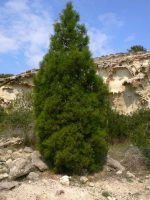 Also called citrus wood by the ancient Romans, this evergreen shrub or small tree is native to the Atlas Mountains of North Africa and is a member of the cypress family, Cupressaceae, that also includes juniper, arborvitae, and redwood. The multistemmed plants grow 20-50′ tall but rarely exceed 30′ and have a pyramidal habit when young. The bark is grayish brown and scaly, cinnamon beneath if exposed by exfoliation. The branches form flat open sprays and carry whorls of small scale-like leaves. Male and female cones appear on the same tree; the female cones are about 1/2″ long, have 2 opposite pairs of thick scales, and sometimes bear a white blume. The male cones are only .16″ long. Photo Credit Wikimedia Commons The Greek word used for this plant in the Bible is thuon which means fragrant wood and some translator use scented wood or citron wood rather than thyine. The Greek word thuon is derived from thuein, meaning to sacrifice, suggesting that the wood was burnt in sacrifices because of its fragrance. Most scholars agree on the identification of the plant as Tetraclinis articulata.
Also called citrus wood by the ancient Romans, this evergreen shrub or small tree is native to the Atlas Mountains of North Africa and is a member of the cypress family, Cupressaceae, that also includes juniper, arborvitae, and redwood. The multistemmed plants grow 20-50′ tall but rarely exceed 30′ and have a pyramidal habit when young. The bark is grayish brown and scaly, cinnamon beneath if exposed by exfoliation. The branches form flat open sprays and carry whorls of small scale-like leaves. Male and female cones appear on the same tree; the female cones are about 1/2″ long, have 2 opposite pairs of thick scales, and sometimes bear a white blume. The male cones are only .16″ long. Photo Credit Wikimedia Commons The Greek word used for this plant in the Bible is thuon which means fragrant wood and some translator use scented wood or citron wood rather than thyine. The Greek word thuon is derived from thuein, meaning to sacrifice, suggesting that the wood was burnt in sacrifices because of its fragrance. Most scholars agree on the identification of the plant as Tetraclinis articulata.
Revelation 18.12 (NKJV) Thyine is mentioned among the items that would no longer be availabe for purchase when Babylon fell.
“merchandise of gold and silver, precious stones and pearls, fine linen and purple, silk and scarlet, every kind of citron wood, every kind of object of ivory, every kind of object of most precious wood, bronze, iron, and marble;”
Thyine wood likes full sun and average, dry, well-drained soil in USDA Hardiness zones 9-ll where the climate is dry. Plants are very drought tolerant, tolerate slightly saline soil and are generally healthy. Propagation is by seed and cuttings. Plants respond positively to coppicing, can be clipped into a hedge as well as used as a windbreak, screen or bonsai. The dark colored fragrant wood takes a high polish and has been valued since antiquity for making furniture.
The genus name, Tetraclinis, is from the Greek words tetra meaning four and kline meaning bed and refers the fact that the leaves grow in groups of 4. The specific epithet, articulata, is the classical Latin word meaning jointed.